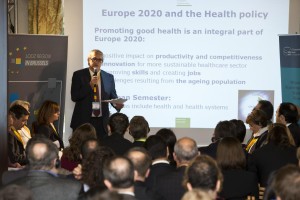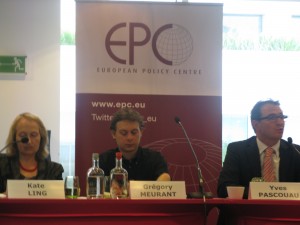MedTech Forum: more needs, higher expectations
On the 15th-17th of October 2014, MedTech Europe’s alliance members Eucomed and EDMA organised the seventh MedTech Forum in Brussels with the theme “More needs. Higher expectations. Smaller bugets.Can the European MedTech industry deliver?” The European MedTech Forum is the largest health and medical technology industry conference in Europe. EFA was represented by Board member Isabel Saraiva, from the Portuguese association RESPIRA. On the 15th, Isabel actively participated in the eight Patient – MedTech Dialogue meeting that discussed several topics, including an update on the Medical Device and In Vitro Diagnostic legislations under revision at European level, and especially the Patient-Centred Company Checklist, agreed between the European Patients Forum and MedTech Europe. The pillars of a patient-centred company were presented as: 1) Safety first and foremost, 2) Mutual Respect, 3) Accessibility; and 4) Fulfilling unmet needs. As stated by the medical technology companies present, the “new paradigm” will imply “further interaction with and empowerment of the patient, in addition to the healthcare professional”. The work plan 2015 and how to best disseminate and communicate the Patient-Centred Company Checklist were also discussed. On the 16th, she attended the workshop “Bring value to your business through patient partnerships”, which brought together a patients’ representative, a medical doctor and a representative from a medical technology company to give their perspectives about patients’ involvement and establishment of partnerships between patients and industry. With some nuances, all of them agreed that asking patients to support them and promote cooperation is the best way to ensure that patients voices are heard and considered.
Allergen labelling at the International European Food and Feed Law Conference
On the 17th of October EFA was invited to speak in the 8th International European Food and Feed Law Conference by Lexxion The Legal Publisher. EU Policy Advisor Roberta Savli presented the patients’ views on the topic of allergens’ labelling ahead of the application of the new food information to consumers’ regulation in December 2014. The presentation gave an overview of EFA’s position on the way allergens need to be emphasised in the ingredients’ list, mandatory information for non-pre-packed food and precautionary labelling and built on the recommendations issued by EFA’s event at the European Parliament “Eating safely: round-table on European best practices on allergens labelling ahead of the entry into force of the Food Information to Consumers regulation”.
What’s the state of Europe? Friends of Europe President's Dinner
EFA EU Policy Advisor Roberta Savli participated in the 15th Friends of Europe President’s Dinner on the 9th of October. This annual event is hosted by Friends of Europe’s President Viscount Etienne Davignon and brings together a few hundred senior European and Member States’ personalities from the worlds of politics, industry and civil society for an intellectually stimulating and entertaining evening. EFA was invited to participate as a guest of Andrea Rappagliosi, President of Vaccines Europe, and Vice-president of Sanofi Pasteur MSD, that is unrestrictly co-financing EFA’s core activities (see here for the complete list of EFA funding partners).
Managing health inequalities at local level
As a part of the 12th European Week of Regions and Cities, on the 7th of October the Regional Office of the Lodzkie Region in Brussels organised an event “Managing health inequalities: how to tackle the demographic challenges?”, where EFA was represented by Junior EU Policy Officer Jelena Malinina.  Health and wellbeing has a great potential to contribute to the growth of the European region. However, there is a need for integrated strategies of both regional and local authorities to address social and demographic determinants of health inequalities to provide the better quality of life to all the citizens. During the first part of the event, the examples of best practices, plans and interdisciplinary projects were presented by the representatives of Spanish, Slovenian, Polish and Czech Republic regions. During the brokerage session of the event, participants had an opportunity to discuss (1) issues posed by the ageing society and ways to address them, (2) what potential mobile health has for the European patients, (3) development of common European approach towards food safety, (4) how to achieve better coordination in healthcare, (4) ways to monitor and evaluate projects related to health. Health and healthcare were strongly emphasized as key drivers of economic development in the “Health for Growth” programme for 2014-2020. Partner regions present during the event recognized the need for actions aimed at increasing innovation capacity and sustainability of the European health care systems, as well as need to ensure easier and wider access to a better and safer healthcare.
Health and wellbeing has a great potential to contribute to the growth of the European region. However, there is a need for integrated strategies of both regional and local authorities to address social and demographic determinants of health inequalities to provide the better quality of life to all the citizens. During the first part of the event, the examples of best practices, plans and interdisciplinary projects were presented by the representatives of Spanish, Slovenian, Polish and Czech Republic regions. During the brokerage session of the event, participants had an opportunity to discuss (1) issues posed by the ageing society and ways to address them, (2) what potential mobile health has for the European patients, (3) development of common European approach towards food safety, (4) how to achieve better coordination in healthcare, (4) ways to monitor and evaluate projects related to health. Health and healthcare were strongly emphasized as key drivers of economic development in the “Health for Growth” programme for 2014-2020. Partner regions present during the event recognized the need for actions aimed at increasing innovation capacity and sustainability of the European health care systems, as well as need to ensure easier and wider access to a better and safer healthcare.
Migrants in the health sector in Europe: rather carer than patient?
On the 7th of October the European Policy Centre’s Coalition for Health, Ethics and Society (CHES) organised a policy dialogue on the role of migrants in the health sector in Europe. Often the topic of migration is discussed in a rather negative sense with an emphasis on the growing burden posed by the migrants on the healthcare systems of their residence countries. However, the representative of the International Organisation for Migration (IOM) and the European Commission (EC) presented some statistics destroying this widely-spread stereotype:
- globally, there are 191 millions of international migrants, which is 3.1% of total population;
- political and “family” reasons are the main drivers of migration but not the “health tourism”. Furthermore, according to the statistics, overwhelming majority of migrants to Europe are working, thus they do not create any additional costs for the healthcare.
- only 8 out of 20 EU Member States provide irregular migrants with the right to the healthcare (which leads to numerous deaths which might have been prevented if an access to the healthcare would be allowed);
- according to the research held in the United States, even irregular migrants contribute to the support of the healthcare systems and they do not benefit from it at the expense of legal residents.
 What is more, migrants are not only users of the health care systems, they are very often work in that systems. According to the UK representative, 1/3 doctors working in the UK are born outside Europe, and currently the UK is in a significant shortage of nurses, general professionals and midwives. The DG SANCO representative confirmed that it is not only a problem for the UK but for the whole Europe: it is expected that by 2020, Europe will experience a shortfall of 1 million healthcare professionals. Health goes hand in hand with social issues, and it is nice to see that the discussions raised in Europe are aimed to the reduction of inequalities and promotion of universal healthcare access, so people coming to the EU for care and protection would not receive more violence and discrimination instead.
What is more, migrants are not only users of the health care systems, they are very often work in that systems. According to the UK representative, 1/3 doctors working in the UK are born outside Europe, and currently the UK is in a significant shortage of nurses, general professionals and midwives. The DG SANCO representative confirmed that it is not only a problem for the UK but for the whole Europe: it is expected that by 2020, Europe will experience a shortfall of 1 million healthcare professionals. Health goes hand in hand with social issues, and it is nice to see that the discussions raised in Europe are aimed to the reduction of inequalities and promotion of universal healthcare access, so people coming to the EU for care and protection would not receive more violence and discrimination instead.